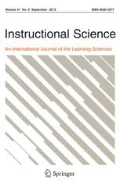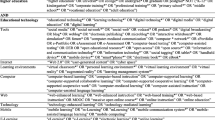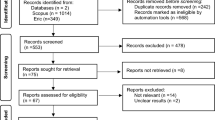Abstract
Professional development on inquiry-based learning (IBL) generally draws heavily on the principle of providing instruction in line with what teachers are expected to do in their classroom. So far, however, relatively little is known about how this impacts teachers’ educational beliefs, even though these beliefs ultimately determine their classroom behavior. The present study therefore investigates how immersion in inquiry-based learning affects student teachers’ beliefs about knowledge goals, in addition to their self-efficacy for inquiry. In total, 302 student history teachers participated in a 4-h long inquiry activity designed within the WISE learning environment, and completed a pre- and posttest right before and after the intervention. Multilevel analyses suggest that the intervention had a significant positive effect on the value that student teachers attributed to procedural knowledge goals, or learning how historical knowledge is constructed, and on student teachers’ self-efficacy for conducting inquiries. Despite these general positive results, however, the results also show that the impact of the intervention differed significantly across students. In particular, it appears that immersion in IBL had little effect on a subgroup of 25 student-teachers, who held largely content-oriented beliefs. Based on these findings, the present study discusses a number of implications for professional development on IBL.




Similar content being viewed by others
References
Alfieri, L., Brooks, P., Aldrich, N. J., & Tenenbaum, H. R. (2011). Does discovery-based instruction enhance learning? A meta-analysis. Journal of Educational Psychology, 103(1), 1–18.
Bandura, A. (1971). Social learning theory. New York, NY: General Learning Press.
Bell, T., Urhahne, D., Schanze, S., & Ploetzner, R. (2010). Collaborative inquiry learning: Models, tools, and challenges. International Journal of Science Education, 32(3), 349–377.
Blumenfeld, P., Soloway, E., Marx, R., Krajcik, J., Guzdial, M., & Palincsar, A. (1991). Motivating project-based learning: Sustaining the doing, supporting the learning. Educational Psychologist, 26(3–4), 369–398.
Borg, M. (2001). Key concepts: Teachers’ beliefs. ELT Journal, 55(2), 186–188.
Bouhon, M. (2009). Les représentations sociales des enseignants d’histoire relatives à leur discipline et à son engagement. Université Catholique de Louvain.
Brand, B. R., & Moore, S. J. (2011). Enhancing teachers’ application of inquiry-based strategies using a constructivist sociocultutral professional development model. International Journal of Science Teacher Education, 33(7), 889–913.
Capps, D. K., Crawford, B. A., & Constas, M. A. (2012). A review of empirical literature on inquiry professional development: Alignment with best practices and a critique of the findings. Journal of Science Teacher Education, 22(3), 291–318.
Copeland, W. D. (1985). Teaching students to “do” history: The teacher and the computer in partnership. The History Teacher, 18(2), 189–197.
Courtney, M. G. R. (2013). Determining the number of factors to retain in EFA: Using the SPSS R-Menu v2.0 to make more judicious estimations. Practical Assessment, Research & Evaluation, 18(8), 1–14.
Crawford, B. A. (2007). Learning to teach science as inquiry in the rough and tumble of practice. Journal of Research in Science Teaching, 44(4), 613–642.
De La Paz, S., & Felton, M. K. (2010). Reading and writing from multiple source documents in history: Effects of strategy instruction with low to average high school writers. Contemporary Educational Psychology, 35(3), 174–192.
De Wever, B., Vandepitte, P., & Jadoulle, J.-L. (2011). Historical education and didactics of history in Belgium. In E. Erdmann & W. Hasberg (Eds.), Facing, mapping, bridging diversity: Foundation of a European discourse on history education (pp. 49–50). Schwalbach: Wochenschau Verlag.
Dillenbourg, P., & Hong, F. (2008). The mechanics of CSCL macro scripts. International Journal of Computer-Supported Collaborative Learning, 3(1), 5–23.
Dobson, R. B. (1970). The peasants’ revolt of 1381. London: Macmillan.
Donnelly, D. F., Linn, M. C., & Ludvigsen, S. (2014). Impacts and characteristics of computer-based science inquiry learning environments for precollege students. Educational Research Review, 84(4), 572–608.
Dyer, C. (1994). Everyday life in medieval England. London: Hambledon Press.
Edelson, D. C., Gordin, D. N., & Pea, R. D. (1999). Addressing the challenges of inquiry-based learning through technology and curriculum design. Journal of the Learning Sciences, 8(3–4), 391–450.
Fang, Z. (1996). A review of research on teacher beliefs and practices. Educational Research, 38(1), 47–65.
Fehn, B., & Koeppen, K. E. (1998). Intensive document-based instruction in a social studies methods course and student teachers’ attitudes and practice in subsequent field experiences. Theory and Research in Social Education, 26(4), 461–484.
Furtak, E. M., Seidel, T., Iverson, H., & Briggs, D. C. (2012). Experimental and quasi-experimental studies of inquiry-based science teaching: A meta-analysis. Review of Educational Research, 82(3), 300–329.
Goodman, J. (1988). Constructing a practical philosophy of teaching: A study of preservice teachers’ professional perspectives. Teaching and Teacher Education, 4(2), 121–137.
Havekes, H., Arno-Coppen, P., Luttenberg, J., & van Boxtel, C. (2012). Knowing and doing history: A conceptual framework and pedagogy for teaching historical contextualisation. International Journal of Historical Learning, Teaching and Research, 11(1), 72–93.
Hmelo-Silver, C. E., Duncan, R. G., & Chinn, C. A. (2007). Scaffolding and achievement in problem-based and inquiry learning: A Response to Kirschner, Sweller, and Clark (2006). Educational Psychologist, 42(2), 99–107.
Hu, L., & Bentler, P. M. (1999). Cutoff criteria for fit indexes in covariance structure analysis: Conventional criteria versus new alternatives. Structural Equation Modeling: A Multidisciplinary Journal, 6(1), 1–55.
Husbands, C. (2011). What do history teachers (need to) know? A framework for understanding and developing practice. In I. Davies (Ed.), Debates in history teaching (pp. 84–95). Oxon: Routledge.
Kagan, D. M. (1992). Implications of research on teacher belief. Educational Psychologist, 27(1), 65–90.
Kim, M. C., Hannafin, M., & Bryan, L. A. (2007). Technology-enhanced inquiry tools in science education: An emerging pedagogical framework for classroom practice. Science Education, 91(6), 1010–1030.
Korthagen, F. A. J. (2013). In search of the essence of a good teacher. In C. J. Craig, P. Meijer, & J. Broeckmans (Eds.), From teacher thinking to teachers and teaching: The evolution of a research community (pp. 241–274). Bingley: Emerald Group Publishing Limited.
Kuhn, D. (2010). What is scientific thinking and how does it develop? In U. Goswami (Ed.), Handbook of childhood cognitive development (2nd ed.). Malden, MA: Blackwell.
Kuhn, D., Weinstock, M., & Flaton, R. (1994). Historical reasoning as theory-evidence coordination. In M. Carretero & J. F. Voss (Eds.), Cognitive and instructional processes in history and the social sciences (pp. 377–401). Hillsdale, NJ: Lawrence Erlbaum.
Lazonder, A. W., & Harmsen, R. (2016). Meta-analysis of inquiry-based learning: Effects of guidance. Review of Educational Research, 1962, 1–38.
Lee, P. (2004). Understanding history. In P. C. Seixas (Ed.), Theorezing historical consciousness (pp. 129–164). Toronto: University of Toronto Press.
Lee, P. J. (2005). Putting principles into practice: Understanding history. In S. Donavan & J. Bransfor (Eds.), How students learn: History in the classroom (pp. 31–77). Washington, DC: National Academies Press.
Levy, B. L. M., Thomas, E. E., Drago, K., & Rex, L. A. (2013). Examining studies of inquiry-based Learning in three fields of education: Sparking generative conversation. Journal of Teacher Education, 64(5), 387–408.
Linn, M. C., Davis, E. A., & Bell, P. (2013). Inquiry and technology. In M. C. Linn, E.A. Davis & P. Bell (Eds.), Internet environments for science education (pp. 3–28). Mahwah, NJ: Lawrence Erlbaum.
Linn, M. C., & Eylon, B.-S. (2011). Science learning and instruction: Taking advantage of technology to promote knowledge integration. New York, NY: Routledge.
Lotter, C., Yow, J. A., & Peters, T. T. (2014). Building a community of practice around inquiry instruction through a professional development program. International Journal of Science and Mathematics Education, 12(1), 1–23.
Maggioni, L., VanSledright, B., & Reddy, K. (2009). Epistemic talk in history. Paper presented at the biennial meeting of the European Association of Research on Learning and Instruction, Amsterdam, The Netherlands.
Mansour, N. (2013). Consistencies and inconsistencies between science teachers’ beliefs and practices. International Journal of Science Education, 35(7), 1230–1275.
Martin, D., & Monte-Sano, C. (2008). Inquiry, controversy, and ambiguous texts: Learning to teach for historical thinking. In W. J. Warren & A. D. Cantu (Eds.), History education 101: The past, present, and future of teacher preparation (pp. 167–186). Charlotte, NC: Information Age.
McDermott, L. C. (1990). A perspective on teacher preparation in physics and other sciences: The need for special science courses for teachers. American Journal of Physics, 58(8), 734.
Morrison, J. A. (2014). Scientists’ participation in professional development: The impact on fourth to eighth grade. International Journal of Science and Mathematics Education, 12, 793–816.
Nadelson, L. S., Callahan, J., Pyke, P., Hay, A., Dance, M., & Pfiester, J. (2013). Teacher STEM perception and preparation: Inquiry-based STEM professional development for elementary teachers. The Journal of Educational Research, 106(2), 157–168.
Nespor, J. (1987). The role of beliefs in the practice of teaching. Journal of Curriculum Studies, 19(4), 317–328.
Pajares, M. F. (1992). Teachers’ beliefs and educational research: Cleaning up a messy construct. Review of Educational Research, 62(3), 307–332.
Pajares, M. F. (1996). Self-efficacy beliefs in academic settings. Review of Educational Research, 66(4), 543–578.
Pedaste, M., Mäeots, M., Siiman, L. A., de Jong, T., van Riesen, S. A. N., Kamp, E. T., et al. (2015). Phases of inquiry-based learning: Definitions and the inquiry cycle. Educational Research Review, 14(1), 47–61.
Reisman, A. (2012). Reading like a historian: A document-based history curriculum intervention in urban high schools. Cognition and Instruction, 30(1), 86–112.
Richardson, V. (1996). The role of attitudes and beliefs in learning to teach. In J. Sikula (Ed.), Handbook of research on teacher education (2nd ed., pp. 102–119). New York, NY: Macmillan.
Rouet, J.-F., Marron, M. A., Perfetti, C. A., & Favart, M. (1998). Understanding historical controversies: Students’ evaluation and use of documentary evidence. In J. F. Voss & M. Carretero (Eds.), Learning and reasoning in history: International review of history education (Vol. 2, pp. 95–116). Abingdon: RoutledgeFalmer.
Slotta, J. D., & Linn, M. C. (2009). WISE science: Web-based inquiry in the classroom. New York, NY: Teachers College Press.
Spronken-Smith, R. A., Walker, K., Dickinson, K. J. M., Closs, G. P., Lord, J. M., & Harland, T. (2011). Redisigning a curriculum for inquiry: An ecology case study. Instructional Science, 39(5), 721–735.
Struyven, K., Dochy, F., & Janssens, S. (2010). “Teach as you preach”: The effects of student-centred versus lecture-based teaching on student teachers’ approaches to teaching. European Journal of Teacher Education, 33(1), 43–64.
Swan, K., & Hicks, D. (2007). Through the democratic lense: The role of purpose in leveraging technology to support historical inquiry in the social studies classroom. The International Journal of Social Studies Education, 21(2), 142–168.
Swennen, A., Lunenberg, M., & Korthagen, F. (2008). Preach what you teach! Teacher educators and congruent teaching. Teachers and Teaching: Theory and Practice, 14(5–6), 531–542.
Teasley, S. (1995). The role of talk in children’s peer collaboration. Developmental Psychology, 3(2), 207–220.
Tschannen-Moran, M., & Woofolk Hoy, A. W. (2001). Teacher efficacy: Capturing an elusive construct.
van Drie, J., & van Boxtel, C. (2008). Historical reasoning: Towards a framework for analyzing students’ reasoning about the past. Educational Psychology Review, 20(2), 87–110.
van Drie, J., van Boxtel, C., & van der Linden, J. (2006). Historical reasoning in a computer-supported collaborative learning environment. In H. M. O’Donnell, C. E. Hmelo-Silver, & G. Erkens (Eds.), Collaborative learning, reasoning and technology (pp. 265–296). Mawhah, NJ: Erlbaum.
van Joolingen, W. R., & Zacharia, Z. C. (2009). Developments in inquiry learning. In N. Balacheff, S. Ludvigsen, T. de Jong, A. Lazonder, & S. Barnes (Eds.), Technology-enhanced learning: Principles and products (pp. 21–37). Berlin, Germany: Springer.
Van Nieuwenhuyse, K., Wils, K., Clarebout, G., Draye, G., & Verschaffel, L. (2015). Making the constructed nature of history visible. Flemish secondary history education through the lens of written exams. In A. Chapman & A. Wilschut (Eds.), Joined-up history: New directions in History Education Research (pp. 231–253). Charlotte, NC: Information Age Publishing.
VanSledright, B., & Limón, M. (2006). Learning and teaching social studies: A review of cognitive research in history and geography. In P. A. Alexander & P. H. Winne (Eds.), The handbook of educational psychology (2nd ed., pp. 545–570). Mahwah, NJ: Lawrence Erlbaum.
Voet, M., & De Wever, B. (2017a). Preparing pre-service history teachers for organizing inquiry-based learning: The effects of an introductory training program. Teaching and Teacher Education, 63, 206–217.
Voet, M., & De Wever, B. (2017b). Towards a differentiated and domain-specific view of educational technology: An exploratory study of history teachers' technology use. British Journal of Educational Technology, 48(6), 1402–1413.
Voet, M., & De Wever, B. (in press). Teachers' adoption of inquiry-based learning activities: The importance of beliefs about education, the self, and the context. Journal of Teacher Education.
Williams, G. C., & Deci, E. I. (1996). Internalization of biopsychosocial values by medical students: A test of self-determination theory. Journal of Personality and Social Psychology, 70, 767–779.
Williams, G. C., Freedman, Z. R., & Deci, E. I. (1998). Supporting autonomy to motivate glucose control in patients with diabetus. Diabetes Care, 21, 1644–1651.
Wilson, S. M., & Wineburg, S. S. (1993). Wrinkles in time and place: Using performance assessments to understand the knowledge of history teachers. American Educational Research Journal, 30(4), 729–769.
Yerushalmy, M., Chazan, D., & Gordon, M. (1990). Mathematical problem posing: Implications for facilitating student inquiry in classrooms. Instructional Science, 19(3), 219–245.
Author information
Authors and Affiliations
Corresponding author
Appendices
Appendix 1: Impact of conditions on student teacher beliefs
See Table 6.
Appendix 2: Overview of the scales and their items
-
1.
Substantive knowledge goals (SKG)
SKG1 Sudents have to learn the characterizing aspects of historical periods.
SKG2 Students must come to understand the key concepts used to describe the past.
SKG3 Students should be able to point out similarities and differences between historical periods.
SKG4 Teachers have to teach their students about the most important evolutions in history.
SKG5 Teachers must let their students situate phenomena within the correct historical period.
-
2.
Procedural knowledge goals (PKG)
PKG1 Teachers should teach their students how to think like historians.
PKG2 Students must learn to use the methods of historians.
PKG3 Students have to be able to form arguments based on evidence about the past.
PKG4 Teachers need to have their students conduct limited historical inquiries.
PKG5 Teachers should show their students the criteria for good historical research.
-
3.
Self-efficacy for inquiry (SEI)
SEI1 I feel able to meet the challenge of analyzing historical information.
SEI2 I am able to draw critical conclusions from information sources about the past.
SEI3 I am capable of evaluating and using information about the past.
SEI4 I feel confident in my ability to conduct an inquiry with historical information.
Appendix 3: Growth models for student teacher beliefs
See Table 7.
Rights and permissions
About this article
Cite this article
Voet, M., De Wever, B. Effects of immersion in inquiry-based learning on student teachers’ educational beliefs. Instr Sci 46, 383–403 (2018). https://doi.org/10.1007/s11251-017-9439-8
Received:
Accepted:
Published:
Issue Date:
DOI: https://doi.org/10.1007/s11251-017-9439-8




